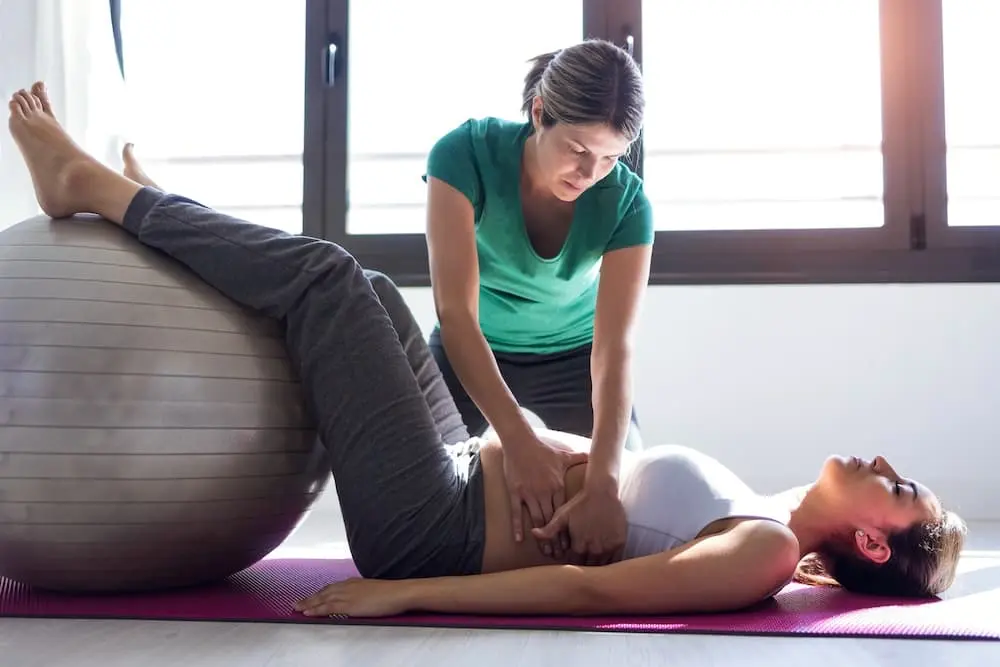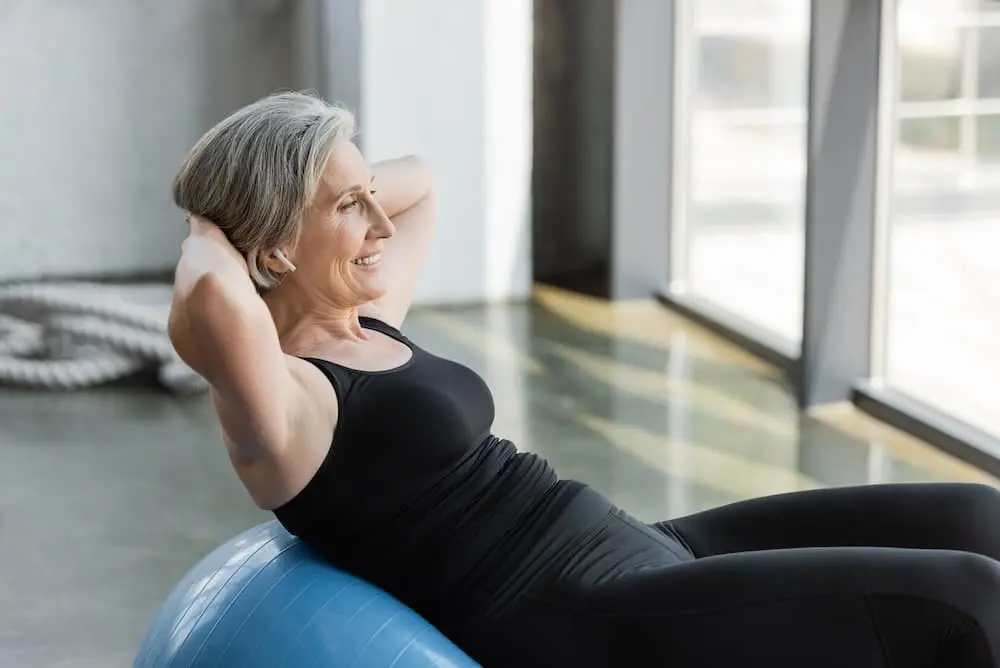FREE WOMEN’S HEALTH WEBINAR’S
MENOPAUSE – Update on treatments available – Thursday 6th March at 7-7.45pm
Dr Joan Scott, GP and Menopause Specialist will discuss the medical aspects of menopause and explain the treatment options available. Elaine Miller, Specialist Women’s Health Physiotherapist, will also be available to answer questions on what you can do yourself to improve the symptoms of menopause.
Don’t miss out on this opportunity to gain knowledge and support from the comfort of your own home.
Our Women’s Health Specialist Physiotherapy Service in Edinburgh offers evidence-based interventions to resolve or manage pelvic floor and women’s health conditions. Let us help you get back to doing the things that you enjoy. Don’t suffer in silence and don’t put up with it!
Physiotherapy plays a vital role in different life stages of women, such as pregnancy, postpartum recovery, menopause and general musculoskeletal health like low back, hip or tail-bone (coccyx) pain.
By addressing pelvic floor dysfunction, managing pregnancy-related issues, aiding in osteoporosis prevention or managing symptoms and providing post-surgery or injury recovery, physiotherapy plays a critical role in maintaining and restoring women’s physical and mental health.
Pelvic floor issues can have a massive impact on women’s mental health. Living with symptoms which are painful or embarrassing creates an emotional load and intrude on the things that we want to do. Many women find it difficult to talk about these problems, or even speak to healthcare professionals or seek help from them. We do not think that is reasonable and seek to break down the shame and stigma that society places on common, curable and manageable conditions which can limit women’s lives.
We want to encourage women to seek help from specialist women’s health physiotherapists rather than put up with these limitations on their lives.

MENOPAUSE - Latest treatments available for menopause
Past event: Tuesday 6th March 2025. Speaker: Dr Joan Scott GP and Menopause Specialist discussed the medical aspects of menopause and explain the treatment options available. Elaine Miller, Specialist Women's Health Physiotherapist, will also be available to answer questions on what you can do yourself to improve the symptoms of menopause.
Watch Webinar

MENOPAUSE - Take control with confidence and resilience
Past Event - Thursday 6th February 2025,
Speaker - Elaine Miller, Specialist Women's Health Physiotherapist will provide valuable insights and practical tips to empower you on your health journey. She will discuss ways to improve the symptoms of menopause including mood, sleep, exercise, sex, posture and balance. There will be time for questions at the end of the webinar.
Watch Webinar

Resolve pelvic pain and Embarrassing Moments.
Past Event - Wednesday 27th November 2024
Speaker Elaine Miller, Women's Health Physiotherapist
Watch Webinar

Why see a Women's Health Specialist Physiotherapist?
Women’s Health physiotherapists have undergone additional post graduate training to specialise in conditions which stem from or affect the pelvis.
We can help using more than just pelvic floor exercises, including:
- Pelvic pain from endometriosis, bladder pain syndrome or undiagnosed cause
- Vulval pain from vaginismus, pudendal neuralgia or undiagnosed cause
- Pelvic organ prolapse – where pelvic organs can shift or lean into the space of the vagina
- Bladder or bowel incontinence – whether that is during sport, hobbies, sex, after having a baby, started with menopause, you have to hurry to the toilet or have been relying on incontinence pads.
- Pelvic floor weakness or under activity
- Pelvic floor tightness or overactivity
- Pregnancy-related bone and muscle issues
- Birth injury, scar management and postpartum joint or muscle issues
- Recovery from injury, surgery or assault
- Menopausal symptoms
- Painful sex from vulval, internal or joint symptoms
- Hip, tail bone and back pain
- Osteoporosis management – weight bearing, balance and strength exercise
- Breast cancer rehabilitation – shoulder and arm mobility, scar tissue mobilisation, fatigue management and return to exercise advice.
- Safe return to exercise after pregnancy, surgery, or injury
What do Women’s Health Specialist Physiotherapists do?
- Women’s health physiotherapists use a variety of techniques:
- strengthening and stretching programmes
- manual techniques like soft tissue and joint mobilisation
- breathing and postural correction
- strapping
- electrotherapy
- biofeedback
- vaginal pessaries
- We assess your joints, spine and posture, breathing patterns, core and skeletal muscle function as well as the ones which make up your pelvic floor. We can examine your vulva and vagina for conditions that would cause pain or issues which would interfere with your sleep, bladder, bowel and sexual function or comfort.
- We can give advice on lifestyle, bladder and bowel habits, returning to exercise after having a baby, injury or surgery. We can liase with your GP, consultant, sports coach, teacher, lecturer, counsellor or psychologist. Women’s health physiotherapy is not just kegels!
Does physiotherapy work?
- There is gold standard scientific evidence showing that specialist pelvic floor physiotherapy services are very effective.
- The NICE Guidelines state that women’s health physiotherapy is front line treatment for pelvic health problems like vaginal prolapse and stress incontinence in women.
- Women’s health physiotherapy is so effective that the Australian Government provides central funding for services and support lines.
- If we can’t help you we will know who can.
What impact does women’s pelvic health have on women’s life?
- These problems are very common and can significantly impact how women live and we don’t know how many of these women could be, or could have been, helped by physiotherapy.
- 60% of women have incontinence at some point in their lives.
- About 1:3 of us wet ourselves a little bit leak when we laugh, cough, sneeze, exercise or open our front door.
- 60% of active women worry about wetting themselves when they exercise.
- 10% of women leak poo.
- Lots of women worry about leaking during sexual activity or have pain during sex.
- Pelvic pain is very common and can be hard to manage alone.
- 70% of pregnant women will have back pain and 1:5 develop pregnancy-related pelvic girdle pain.
- 50% of women over the age of 50 have vaginal prolapse.
- The most common reason for an older woman to move into residential care is dementia, the second is incontinence.
What happens at a first appointment?
- Appointments take place in a quiet, relaxed and warm private room
- You will be asked specific questions to establish what is causing your symptoms
- We will discuss what you want to achieve, setting goals and expectations and ensure treatment is specific to your problem
- Wear whatever you want, there’s no need for special clothing and it makes no difference at which stage of your menstrual cycle you are in.
- A vaginal examination is usually offered as part of the assessment. You do not have to have this examination on the first appointment or at any point. We can assess with your underwear or clothing on. You will never be asked to do anything during your assessment which makes you feel uncomfortable.
- You can get changed behind a screen or be assisted to undress and get onto the plinth. The plinth has absorbent pads, pillows and blankets on the plinth which are changed after every appointment.
- If you are happy to have a vulval examination this usually consists of an observation of the skin of the vulva, asking you to cough, light pressure from a lubricated, gloved finger on the surface muscles or scar tissue, palpation of the vaginal walls to examine tender spots, muscle integrity, co-ordination and strength. There is absolutely no pressure to have any, some or all parts of the examination and you can change your mind at any time during the appointment.
- The appointment will end with a plan, some homework and an agreed follow-up time. You will be given some information in leaflet or digital form which might be about your diagnosis, along with a bladder or bowel diary and links to useful resources or items which might be helpful.

Pelvic Floor Health:
Physiotherapists specialised in women’s health are trained to assess and treat pelvic floor dysfunction. The pelvic floor muscles support the bladder, uterus, and bowel, and dysfunction can lead to issues like:
- Urinary incontinence: Leakage of urine, especially after childbirth or during menopause.
- Pelvic organ prolapse: A condition where organs like the bladder or uterus descend due to weakened pelvic muscles.
- Painful intercourse or pelvic pain: Conditions like vaginismus or dyspareunia can benefit from pelvic floor therapy.
Physiotherapy treatments often include pelvic floor exercises (e.g., Kegel exercises), biofeedback, manual therapy, and lifestyle advice to strengthen and rehabilitate the muscles.
Pelvic Floor Exercises
Why should I strengthen my pelvic floor muscles?
Pelvic floor exercises can help strengthen the muscles under the uterus, bladder, and bowel (large intestine). They can help women (and men) who experience urine leakage or poor bowel control.
With regular training most women (and men) can stop all leakage and regain full bowel and bladder control and get back to enjoying life to the full.
Even a small leakage is not normal and can get worse, so start now with the exercises below.
How do I strengthen my pelvic floor muscles?
- Begin with a deep breath in, sigh out
- Firstly, squeeze and lift your anus (like holding in a fart) but AVOID SQUEEZING YOUR BUTTOCKS. Hold for 10 seconds and keep your breathing relaxed.
- Then do10 fast, hard squeezes and lifts, but relax between each one
- Do these two exercises, a hold for 10 and 10 quick flicks, three times a day, every day, until you are dry, and then once a day, every day and you will stay dry
- “Hold for 10 and 10 quick flicks. 3 times a day We won’t pee with a 10, 10, 3”
Important note: If the exercises hurt or don’t help then come and see your Women’s Health Physiotherapist or speak to your GP
How do I know I am contracting the right muscles?
It is important to find the right muscles to tighten otherwise they will be ineffective.
A pelvic floor exercise is like pretending that you want to hold in a fart or like you want to stop midstream when urinating.
The next time you have to urinate, start to go and then stop. Feel the muscles in your vagina, bladder, or anus get tight and move up. These are the pelvic floor muscles. If you feel them all tighten, you have done the exercise right.
If you are still not sure whether you are tightening the right muscles, keep in mind that all of the muscles of the pelvic floor relax and contract at the same time.
If you still struggle with the exercises your Women’s Health Physiotherapist will be able to help you.
When should I do my pelvic floor exercises?
Carry out your routine at any time. Try to do them when lying down or sitting first and get used to them. Then try to do them standing. Once you have mastered them you can do them at any time – sitting at work, at the bus stop or even when going out for dinner if the conversation is boring!
How long should I keep the pelvic floor exercises going?
If you want to stay dry, keep the exercises going forever and a day
Menopause Support
During menopause, women may experience symptoms like joint pain, pelvic floor issues, and decreased bone density. Physiotherapy can help by:
- Offering pelvic floor exercises to manage incontinence.
- Providing exercise programs to maintain strength, flexibility, and bone health.
- Managing musculoskeletal pain, which can increase during menopause.
Chronic Pelvic Pain and Post-Surgical Recovery
Physiotherapy can provide manual therapy, soft tissue release, and exercises to help women recover from pelvic surgeries, manage chronic pelvic pain, or recover from gynaecological surgeries.
Pregnancy and Postpartum Care:
Pregnancy and childbirth put a significant strain on the body, especially on the back, pelvis, and abdominal muscles. Physiotherapy can help by:
- Alleviating pain: Back, pelvic, and hip pain are common during pregnancy, and physiotherapists can provide safe, tailored exercises to relieve discomfort.
- Postural corrections: Posture changes during pregnancy can lead to discomfort, and physiotherapy can help improve alignment and balance.
- Postpartum rehabilitation: After childbirth, physiotherapy can assist with recovery by targeting abdominal muscle separation (diastasis recti), pelvic floor rehabilitation, and overall physical strengthening.
- Cesarean section recovery: Physiotherapy can help with scar tissue mobilisation and abdominal rehabilitation after a C-section.
Osteoporosis Management:
Women are more prone to osteoporosis, particularly after menopause due to reduced estrogen levels. Physiotherapy can help manage and prevent osteoporosis by:
- Weight-bearing exercises to improve bone density.
- Balance and coordination exercises to reduce the risk of falls and fractures.
- Strength training to improve overall muscle tone and joint support.
Breast Cancer Rehabilitation
Physiotherapy is beneficial for women recovering from breast cancer surgery or treatments like mastectomy or radiation therapy. It can help by:
- Lymphedema management: Reducing fluid buildup in tissues.
- Scar tissue mobilization to prevent tightness and improve range of motion.
- Restoring shoulder and arm mobility, which can be affected by surgery or radiation.
Pain Management for Conditions Like Endometriosis
Endometriosis and other gynecological conditions can cause chronic pelvic pain. Physiotherapy can help manage this pain through:
- Manual therapy to release tension in the pelvic muscles.
- Exercise programs designed to reduce inflammation and improve blood flow.
- Education on posture and ergonomics to minimize pain during daily activities.

Useful gold standard references
MAMMI study on postnatal pelvic floor symptoms
https://www.futurelearn.com/info/courses/womens-health-after-motherhood/0/steps/126716
POPPY study on prolapse
https://www.thelancet.com/journals/lancet/article/PIIS0140-6736(13)61977-7/fulltext
PROPEL study on pelvic floor exercises for prolapse
https://bmchealthservres.biomedcentral.com/articles/10.1186/s12913-017-2795-x
urine leaking in elite female athletes
https://pmc.ncbi.nlm.nih.gov/articles/PMC7386138/
urinary incontinence and falls
https://pmc.ncbi.nlm.nih.gov/articles/PMC8133449/
Cochrane review – pelvic floor exercises
https://www.cochranelibrary.com/cdsr/doi/10.1002/14651858.CD005654/full
NICE guidelines for pelvic floor
NICE guidelines for vaginal prolapse and urinary incontinence
https://www.nice.org.uk/guidance/ng123
Current conservative pelvic floor recommendations
https://www.bmj.com/content/376/bmj.n3049
Bristol Stool Reference Sheet
Bladder Irritants Reference Sheet
Other useful links
MASIC – birth injuries
https://masic.org.uk/downloadable-guides/
Mesh:
https://www.scottishmeshsurvivors.com/our-petition.html
https://www.patientsafetycommissioner.org.uk/resource-for-patients-with-pelvic-mesh/
NHS vaginal dryness
https://www.nhs.uk/conditions/vaginal-dryness/
https://www.themenopausecharity.org/2021/10/21/vaginal-dryness-2/
NHS pelvic floor
NHS prolapse
https://www.nhs.uk/conditions/pelvic-organ-prolapse/
NHS pelvic girdle pain in pregnancy
https://www.nhs.uk/pregnancy/related-conditions/common-symptoms/pelvic-pain/
NHS pelvic pain
https://www.nhs.uk/conditions/pelvic-pain/
NHS types of incontinence
https://www.nhs.uk/conditions/urinary-incontinence/causes/
NHS bladder incontinence
https://www.nhs.uk/conditions/urinary-incontinence/
NHS bowel incontinence
https://www.nhs.uk/conditions/bowel-incontinence/
NHS vulval skin
https://www.nhs.uk/conditions/vaginitis/
NHS vaginismus
https://www.nhs.uk/conditions/vaginismus/
NHS vulvodynia
https://www.nhs.uk/conditions/vulvodynia/
NHS post pregnancy
https://www.nhs.uk/conditions/baby/support-and-services/your-post-pregnancy-body/
NHS falls prevention
https://www.nhs.uk/conditions/falls/prevention/
NHS menopause
https://www.nhs.uk/conditions/menopause/
NHS osteoporosis
https://www.nhs.uk/conditions/osteoporosis/
NHS physio post mastectomy
https://www.dbth.nhs.uk/physiotherapy-following-breast-cancer-surgery/
Find a location near you
The Physiotherapy Clinics - Gracemount
The Physiotherapy Clinics - Leith
The Physiotherapy Clinics - South Gyle
Peebles Physiotherapy
The Physiotherapy Clinics - Fairmilehead
EXCELLENTTrustindex verifies that the original source of the review is Google. I can't thank Peter enough for guiding me through my shoulder rehabilitation program over the past few months. His instructions were very clear and the instructional videos made available through the app were really useful. I'd had niggling, low-level pain in my shoulder for around 13 years and then recently I lost full range of motion due to a karate injury; after working with Peter I can honestly say that my shoulder now feels better and stronger than it has done for a very long time! Thanks again :-)Trustindex verifies that the original source of the review is Google. Very grateful. Great serviceTrustindex verifies that the original source of the review is Google. I received fantastic, friendly help from Biju for a minor leg injury. The treatment and exercises he gave me completely sorted my issue. Would 100% recommend both him and the clinic!Trustindex verifies that the original source of the review is Google. Had a great experience at this clinic. Antony put together a detailed treatment plan for treating knee pain. He clearly explained how each exercise would benefit the activities I wanted to be able to do. Not only is he a great physio, but he is so friendly and always makes you feel listened to.Trustindex verifies that the original source of the review is Google. Phil has been supporting me a long standing complicated issue, which previous places have been unable to help. Phil's extensive experience and positive approach, coupled with his willingness to think outside the box is making a difference. Recently this approach has included the 3D movement scan. It's very easy to participate in, and it revealed problematic postural and movement detail that would be harder to discover by other means. I recommend the 3D scan as a rehabilitation tool.Trustindex verifies that the original source of the review is Google. I highly recommend the physiotherapy clinic South Gyle. I received a detailed assessment of my problem from Phil. He clearly explained the issues I'm having and why, plus the treatment, exercises required to rectify. Really happy with my experience and I would not hesitate to go back. Thanks PhilTrustindex verifies that the original source of the review is Google. I first attended the South Gyle clinic to see Anthony Guiducci on February 2023. I was suffering from a very painful trapped nerve in the lower back. Later in the year, with the back issue having been virtually cleared, I developed some nerve pain in the right knee along with general stiffness in the left knee. Finally around late October I had "tennis elbow" on my right elbow.I should say that I am 73 years old and spent many years playing contact sports, mainly rugby and football and now in my twilight years golf. It catches up with you eventually 😁. All through this time Anthony has been totally professional with a great knowledge of muscle and nerve structure and their interaction. His approach to giving you remedial exercises is well structured to your ability and takes great care that you keep within your capabilities as you build up the strengthening and more testing lessons. I can highly recommend him to anyone looking for physio help with their injuries or aches and pains. I must also say that, on the odd occasion when I had to use other physios at South Gyle, due to holiday leave I was equally impressed by the expertise of the staff.Trustindex verifies that the original source of the review is Google. Came here with a mild hamstring strain, ran a 3:30 marathon 5 weeks later! Anthony Guiducci = legendTrustindex verifies that the original source of the review is Google. Really thorough consultation. Excellent advice and follow-up arranged.